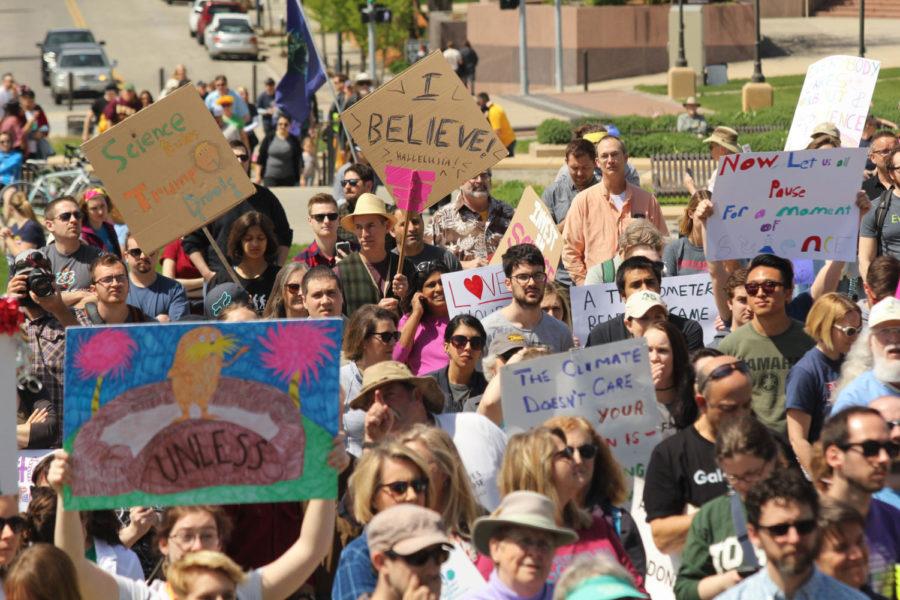March for Science encourages advocating for science in Iowa
People of all ages gathered April 22 to show their support for science and the role it plays in improving society during the March for Science in Des Moines. This gathering was just one of over 600 taking place around the world for the cause.
April 23, 2017
Iowans clad in lab coats carrying signs reading “science trumps fake news” assembled on Earth Day to oppose the defunding of science-based programs.
With the recent defunding of EPA programs and lawmakers pushing to dismantle the Leopold Center for Sustainable Agriculture, Iowans took it upon themselves to “March for Science” at the Capitol in Des Moines. With more than a thousand attendees, adults and children holding signs claiming “science will win in the end” and “persistence is in our DNA,” the group listened to a lineup of seven speakers. They later attended expos taught by local scientists.
Kaitlin Higgins, an organizer of the March for Science and senior in genetics, began organizing a march in Iowa after hearing the recent decisions made in public office regarding environmental policy.
“Slowly over the last 20 years it seems like people have been getting more and more anti-science, so the silencing of the EPA was kind of a catalyst where we need to say something and do something instead of just letting people have these ridiculous beliefs,” Higgins said.
Although Higgins was aware of the number of people that RSVP’d on Facebook, seeing the crowd in person was proof that people are concerned about the same issues as she is.
“We’re hoping that [the march] at least starts a conversation about how important evidence is when it comes to policy, and we also want to make science more accessible because part of the issue is people thinking science is up in an ivory tower, which is not really true,” Higgins said.
Kathryn Hays, student at Simpson College in Indianola, noticed the importance of advocating for science-based policies after taking an environmental issues class.
“I think [the state of our environment] is definitely one of the most important issues facing our country right now, and it’s not getting enough attention as it should be,” Hays said. “I hope that [the march] brings to light issues that are not being acknowledged right now and shows that our citizens do care about the environment, whereas businesses and corporations might not care as much.”
Iowa Sen. Joe Bolkcom joined the marchers to wish everyone a happy Earth Day and tell them about political decisions in Iowa.
“In the last two weeks, the Republican Legislature did the following: They abolished the Leopold Center for Sustainable Agriculture, sunset did away with the funding for the Iowa Energy Center and the University of Iowa center for Global and Regional Environmental Research, they cut the work of the Iowa Flood Center by $300,000 and cut millions more from our three great public universities that do research and teach our next generation of scientists,” Bolkcom said.
Based on the decisions that were made in the Capitol, Bolkcom said Iowa will be less prepared to manage the negative effects of extreme weather and climate change.
Bolkcom asked the attendees of the march to help make Iowa more secure and productive.
He suggested that Iowans should advocate for long-term ways to invest in conservation, get involved in political campaigns and speak up for science by supporting public school funding, sharing science facts and demanding that elected officials support science.
James Oliver, university professor in the mechanical engineering department at Iowa State, attended the march to speak about science in the 21st century.
“We should all be thanking our lucky stars we were born in this century or the last one because in the broad sweep of human history science is a blip … our lives are infinitely better because of science,” Oliver said.
Representative democracy comes with a social contract with the government, Oliver said. He continued that as long as we follow the rules and pay taxes the government should take care of us.
Representative democracy hasn’t held up its end of the bargain in taking care of the public good when it comes to science, he added.
“When our policy makers ignore scientific evidence, it’s irresponsible at best and unethical at worst,” Oliver said.
Oliver encouraged marchers to “teach people what science is. We all took it in school, but some of us forgot.”
















